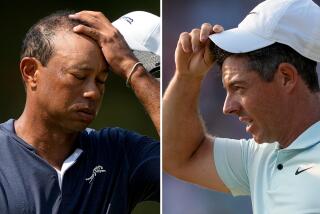Two and Two Doesn’t Add Up
- Share via
It was hardly made-for-television golf, but it could have been worse.
They could have kept playing until Roger Twibell asked someone--golfer, marshal, groupie, anybody--a tough question. In that case, they would have had to drag the 131st British Open into today, deciding the thing the way they occasionally do at the U.S. Open.
They could have gone to penalty kicks, which would have given France’s Thomas Levet a decided advantage over Ernie Els (represents South Africa--rugby country) and Stuart Appleby and Steve Elkington (both represent Australia--boomerang country).
Or they could have left Bud Selig in charge of the Claret Jug, which would have kept the official engraver working overtime, but not a single golfer. No playoff. No sudden death. Appleby, Elkington, Els and Levet: 2002 British Open Quad-Champions.
Instead, the British Open officials at Muirfield took a look at the four-way tie at the end of regulation--unprecedented at a major golf championship--and scratched their heads a bit and came up with something that involved coins, alphabetical order and luck of the draw. But, and we should be thankful, no rock, paper and scissors.
What to do with four players tied after the completion of 72 holes?
Let them play four more holes.
Sounds good so far. Round them up, send out the foursome, let’s get this thing rolling.
ABC’s commentary crew was rubbing hands in anticipation, until Mike Tirico was given the official word.
“I believe it’s going to be two twos,” Tirico said, sounding slightly baffled. “Not one group of four.”
This was golfing history, with a worldwide television audience still hanging in there, curious to see what happens at a major championship when four players are tied atop the leader board Sunday and Tiger Woods isn’t one of them. Hmm, you mean they don’t just abandon the tournament?
No, they play on, although not together, not all at once, not in Scotland.
Sunday, they took a perfectly reasonable-sounding foursome and decided to split them into two confounding groups of two, one pair playing ahead of the second, one pair unaware of how the other pair was faring.
Saturday’s third round, subtitled “Monsoon at Muirfield,” was easy TV viewing by comparison. Sure, the live footage often appeared to have been shot underwater through an infrared lens, with shivering golfers rendered almost unrecognizable by their ski caps, rain parkas and umbrellas. At least you could figure out who was ahead and who was shooting a send-in-the-Coast-Guard round of 81.
Saturday rained confusion on the British Open.
Sunday, confusion reigned.
Looking as if they were making up the rules by the second, Open officials gathered the playoff foursome together and had them draw lots. This involved four numbered coins, placed face down on a tray and scrambled around like a shell game. Each player was instructed to select a coin, their draft positions determined by alphabetical order.
Appleby, therefore, picked first. But after that, there was only more confusion. Els looked at Elkington. Elkington looked at Els. Let’s see, K comes before S, right?
Evidently, golfers are much better with numbers.
Finally, officials had their pairings. Elkington and Levet were grouped together and would tee off first, followed by Appleby and Els.
Tirico quickly asked the question that had to be raised.
“You guys find it strange at all that it’s not all four together out here at once in the playoffs--that it’s two and two?” he wondered.
Ian Baker-Finch said he was “really surprised.”
Curtis Strange said he would “rather have everybody together, watch what’s going on out there. Makes for great theater.”
Tirico called it “bizarre and different.”
Strange and Baker-Finch debated which group held an advantage during the playoff. Baker-Finch opted for the second, reasoning they would see the scores just posted by the first and could adjust their strategy accordingly. Strange said the first group could dictate pace, quipping that they “can slow the play of the second group, throw ‘em off.”
Along with television commentators and viewers.
On their first hole, Levet made par and Elkington made bogey. Els and Appleby then proceeded with their tee shots. ABC cut to commercial, leaving Tirico to report, with all the accuracy available at the moment, “I guess Levet’s leading for now.”
Playoff golf is as dramatic as the sport gets, but Sunday, the traditional brand of suspense--who’s going to win?--was replaced by something altogether different--who’s leading and who’s trailing? And who just birdied that hole over there? Els and Appleby had to wonder after Levet, well beyond their view, caused the crowd to roar ahead of them.
“Maybe,” Strange mused, “somebody will tell them.”
Just the way they used to do it at the 1902 British Open.
Helpfully, Appleby and Elkington fell out of contention after the fourth playoff hole, leaving Els and Levet on their own for sudden death. That much, everyone could follow. Then Els finished a stroke ahead of Levet on the next hole. Finally, a clear-cut result: Els, alone at last, was the winner.
Twosomes may have worked for Noah, back when the playing conditions were nearly as wet as Saturday’s. But Sunday, British Open officials needed to heed the oldest links call of all, give or take the proper spelling.
Four!
More to Read
Go beyond the scoreboard
Get the latest on L.A.'s teams in the daily Sports Report newsletter.
You may occasionally receive promotional content from the Los Angeles Times.










